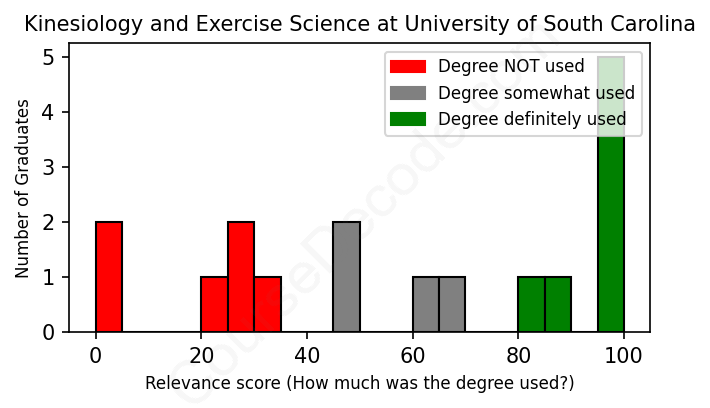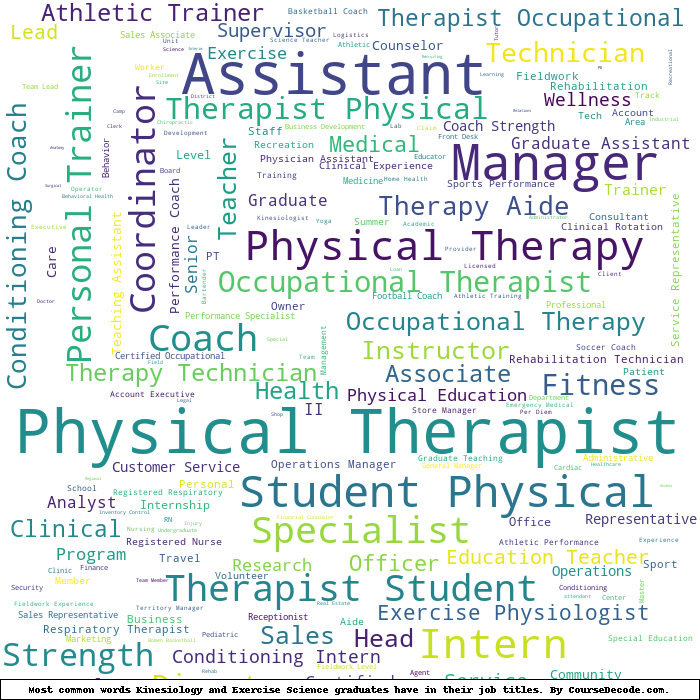
First, some facts. Of the Kinesiology and Exercise Science graduates from University of South Carolina we've analyzed , here's how many have used (or NOT used) their degree in their career:

These are estimates based on AI analysis of 17 LinkedIn profiles (see below).
The verdict? Below average. Overall, with an average relevance score of 58%, Kinesiology and Exercise Science graduates from University of South Carolina have a lower likelihood (-9%) of finding work in this field compared to the average graduate across all fields:
And for comparison, here's the chart for all profiles we've looked at across all degrees.
Also, after graduating, 58% of these graduates have pursued further education other than another Bachelor's degree (such as a Masters degree or other), compared to the average across all profiles of 35%. This suggests you may need more than just a Bachelors degree to be competitive as a Kinesiology and Exercise Science graduate.
See the details:
|
Relevance score: 0% We think this person has NOT gone into a career related to their degree. We think this person has NOT gone into a career related to their degree.
DEGREE INFOGraduated in 2015 from University of South Carolina with a Bachelor of Science - BS in Kinesiology and Exercise Science. Also pursued further education since (see below). JOB HISTORY SINCE GRADUATIONAssociate Attorney LAW OFFICE OF R. MILLS ARIAIL, JR. Aug 2020 - Present FURTHER DEGREES DONE SINCE GRADUATINGDoctor of Law - JDUniversity of Richmond School of Law 2016 - 2019 ABOUTNo information provided. |
The top 10 most common jobs done by the graduates we've analyzed (ranked most common to least) are:
When we look at the job paths of graduates from the Kinesiology and Exercise Science program at the University of South Carolina, it seems like a mixed bag. Many folks have landed roles that tap right into the heart of what they studied, like Exercise Physiologists, Personal Trainers, and Rehabilitation Technicians. These positions clearly benefit from the specialized knowledge and skills they gained during their studies, making them very relevant to kinesiology. In fact, jobs involving direct patient interaction or exercise prescription are often where graduates thrive, utilizing their understanding of human movement and physiology to help others achieve their fitness or rehabilitation goals.
On the flip side, quite a few graduates have ventured off into roles that don't connect with their degree at all. We see a fair amount of graduates working as pharmacists, attorneys, or in administrative positions where Kinesiology knowledge is pretty much irrelevant. This shows that, while the degree offers a solid foundation for health and fitness-related careers, it doesn't pigeonhole graduates into one specific path, allowing them to explore various fields. So, while many find jobs that align closely with their studies, others take a more diverse route that doesn't directly tie back to Kinesiology and Exercise Science.
Here is a visual representation of the most common words in job titles for Kinesiology and Exercise Science graduates (this is across all Kinesiology and Exercise Science graduates we've analyzed, not just those who went to University of South Carolina):

Graduates from the University of South Carolina with degrees in Kinesiology and Exercise Science seem to have taken a mixed bag of career paths. For many of these graduates, the first jobs right out of school often lean towards roles like intern or technician positions in various health and exercise-related fields, including personal training and rehabilitation. For example, some found themselves working as personal trainers or rehabilitation technicians, which are definitely relevant to their degrees. However, there are also quite a few who ventured into entirely different sectors, like pharmacy or even law, which could suggest that they either shifted their interests or faced challenges finding jobs directly related to their field.
Fast forward five or ten years, and it looks like some graduates do manage to carve out successful careers connected to Kinesiology and Exercise Science, particularly in areas like physical therapy, cardiac rehabilitation, and occupational therapy. However, there are also numerous profiles of people who seem to have drifted into roles that don't directly utilize their educational background at all. This mix of relevant and unrelated career paths raises questions about the job market for Kinesiology graduates and whether they end up pursuing their original goals or adapting to other opportunities. Overall, while some graduates are thriving in health and wellness fields, others appear to have taken more circuitous routes in their careers.
Honestly, a Bachelor’s degree in Kinesiology and Exercise Science can be quite manageable, especially if you have a passion for the subject. At the University of South Carolina, you'll hit a mix of core classes that dive into anatomy, physiology, and biomechanics, along with some hands-on labs that really bring the material to life. It’s not a walk in the park, though, since you’ll still need to put in the effort to understand the scientific concepts and complete practical assignments. If you enjoy staying active and are interested in how the body works, you might find it a bit easier than some more intense majors like engineering or chemistry. Just be ready to engage with both theory and practice, and you should do just fine!
Most commonly, in the LinkedIn profiles we've looked at, it takes people 4 years to finish a Bachelor degree in Kinesiology and Exercise Science.
Looking at these graduates from the University of South Carolina, it seems like there's a pretty mixed bag when it comes to financial success. On one hand, the early pharmacy roles and legal positions like that associate attorney job likely pay pretty well, making it seem like the first grad is doing just fine financially. On the flip side, many of the recent grads are still in entry-level or internship-type positions in fields like personal training and rehab, which typically don’t pay as much, at least not right away. It looks like some have tapped into better-paying roles with experience, while others are still grinding it out. Overall, it seems some are making decent money, while others have a bit more of a struggle ahead before they hit their stride financially.
Here is a visual representation of the most common words seen in the "about" section of LinkedIn profiles who have a Bachelor degree in Kinesiology and Exercise Science (this is across all Kinesiology and Exercise Science graduates we've analyzed, not just those who went to University of South Carolina). This may or may not be useful:

Here are all colleges offering a Bachelor degree in Kinesiology and Exercise Science (ordered by the average relevance score of their Kinesiology and Exercise Science graduates, best to worst) where we have analyzed at least 10 of their graduates: